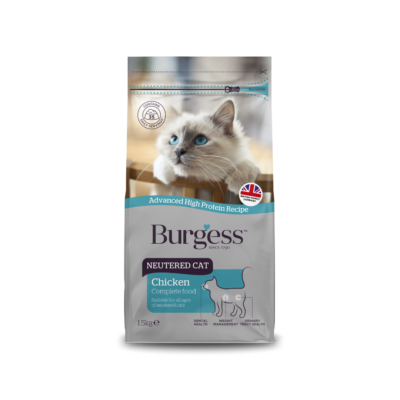
If you haven’t got round to neutering your cat yet, then there’s no time like the present! And, as 27 February marks the date of World Spay Day, there’s plenty of information and advice available to help you make the best choice for your cat.
“We’re here to champion neutering your cat as the kindest thing you can do for them,” states Cats Protection, which reveals that 12% of the UK’s cats aren’t neutered. As there are around 11 million owned cats in the UK, that equates to more than a million (1,320,000) felines that are currently unneutered.
CAT NEUTERING FAQ
1. Should I let my female cat have a litter before neutering?
There is no benefit to letting your female cat have a litter of kittens before you get her neutered. Because female cats reach sexual maturity so young, it may even be harmful to let them have a litter of kittens, especially while they are still kittens themselves.
Source: Cats Protection
As well as avoiding unwanted litters of kittens that will all need to be found good homes, the charity sets out some of the key benefits neutering can bring:
The benefits of neutering a female cat can include:
- Preventing behaviours associated with being in ‘heat’, which can include calling, spraying, and trying to escape or wandering further than normal
- Reducing the risk of womb infections
- Reducing the risk of tumours and certain cancers, for example mammary cancer (which is over 90% less likely if cats are spayed before six months old)
- Helping your cat to stay healthy. Female cats can have up to 18 kittens a year which is a lot of extra mouths for owners to feed and rehome, and can cause females to lose condition and be more vulnerable to disease
2. Will neutering change my cat’s personality?
Some people worry that their cat’s personality will change. This isn’t true but you might see a fall in certain behaviour – roaming, mounting, or fighting.
Source: Blue Cross
The benefits of neutering a male cat can include:
- Reducing the risk of them roaming far away to find a mate, therefore making it less likely they will get lost or injured in a car accident
- Reducing the risk of them fighting with other males, which in turn can help to prevent them contracting and spreading infectious disease such as feline immunodeficiency virus (FIV) and feline leukaemia virus (FeLV)
- Reducing the risk of spraying in the house – something unneutered cats do to mark their scent to appeal to potential female mates
3. What is spaying or castrating? Are they the same as neutering?
Neutering is the general term for the operation in all cats and this includes either spaying or castrating. Spaying is the word used to describe a female cat getting neutered, and castrating is the word used to describe a male cat getting neutered.
Source: Cats Protection
4. What age can cats be neutered?
Cats Protection advises: “Cats can be neutered at any age, but we’d recommend getting your kitten neutered at around four months old. This is because female cats can start having kittens from around this age, so to prevent any unwanted litters it’s important to get them neutered as soon as possible. Remember, cats aren’t selective about who they breed with and will even breed with siblings!”
The charity even has a Kitten Neutering Vet Database to help you find your nearest practice to neuter your kitten, along with information on help with the cost. Also check with your local RSPCA to see if you are eligible for low-cost vet care, including neutering, as well as PDSA and Blue Cross.
WORLD SPAY DAY – CHAMPIONING NEUTERING AS A POSITIVE CHOICE FOR PETS
This year, World Spay Day falls on 27 February. This international event is supported by nine of the UK’s animal welfare charities – The Blue Cross, Battersea, Cats Protection, Celia Hammond Animal Trust, International Cat Care, Mayhew, PDSA, RSPCA, SSPCA and Wood Green, who know all about the very best ways to care for our beloved pet cats.
For more advice, check out Cats Protection’s guide to neutering >>
5. Will my cat get fat after neutering?
Once your cat is neutered, they won’t need to eat as much as an unneutered cat to stay a healthy weight. You can simply reduce their portion sizes, or some foods contain fewer calories. Speak to your vet for advice on feeding recommendations following neutering and if you are concerned.
Source: Cats Protection
Neutering means that your cat’s nutritional needs can change
While neutering has many benefits, it does mean a cat’s needs can change. Your feline friend will require fewer calories, as his or her body has less work to do. In fact, just 48 hours after neutering cats need an estimated 20% fewer calories.
Neutered cats are also more likely to have urinary tract infections and it increases the likelihood of hairballs.
Burgess in-house vet, Dr Suzanne Moyes MVB MRCVS, who oversees recipe development and product production, advises: “It’s a good idea to regularly monitor your cat’s weight and switch to a diet specially created for neutered cats to prevent them from becoming overweight and to help with other changes.”
In fact, Burgess Pet Care has undertaken detailed nutrition research – along with all-important taste tests – and have created an advanced, high protein recipe that contains the essential nutrients and vitamins that your neutered cat needs to help them stay healthy and content. Suitable to feed from the age when a cat is neutered, award-winning Burgess Neutered Cat is:
- High in tasty and digestible meat protein to help maintain lean muscle mass
- Contains *added L-Carnitine to help weight maintenance
- Formulated to support a healthy urinary system
- Contains a specialist ingredient to help teeth and gum health
- The fibre in our recipe helps to prevent hairballs
- Added yucca extract helps to reduce litter tray odours and helps with stool formation
Dr Moyes adds: “At Burgess, we believe this recipe containing a whole host of beneficial ingredients – including L-carnitine to promote the use of fat stores for energy and to help preserve muscle mass – will help support the health and wellbeing of neutered cats of all ages.”
The proof is in the eating – so why not try Burgess Neutered Cat with your neutered cat?
CARE MORE Get more advice on caring for your cat from Burgess, the pet experts. Training, nutrition, grooming and general care. It's all here >>
Every cat deserves a delicious, nutritious dinner. At Burgess, all our cat food is made using premium ingredients and is high in protein, to ensure excellent quality and superior taste to help keep your cat happy and healthy – from kitten, to adult and mature and our award-winning variety for neutered cats.
Is your cat a Burgess cat? Join the Burgess Pet Club for exclusive offers and rewards.
If you found this interesting, you may also like:
NEUTERING – ONE OF THOSE THINGS ON YOUR 'TO DO' LIST? When it comes to neutering their pets, people often have strong opinions. But the science is unequivocal – for most pets, including dogs, cats, rabbits and ferrets, neutering is not only the best way to prevent unwanted litters, but it also protects against life-threatening diseases.
CARING FOR KITTENS Discover how you can help your kitten get the very best start in life.
WHY CATS LIKE THE HIGH LIFE! Is your cat a climber? Does your favourite feline always find a way to scale wardrobes, bookcases and even your curtains? Have you ever wondered why cats like to perch in high places?
DOES YOUR CAT KNOW THEIR NAME? Whatever name we choose to bestow upon our beloved pet cats, does it make any difference to them? Do they actually understand that they’re called Alfie or Bella or even Archibald von Snugglemuffin?
THE HOMING INSTINCT – CAN CATS REALLY FIND THEIR WAY HOME? Top tip – it’s much easier if they’re microchipped! Plus, what a change in the law will mean for every cat owner...
EARLY LEARNING FOR KITTENS How we interact with, play with and ‘train’ a new kitten will have a big influence on their behaviour around people as an adult cat, so it’s important to go about it in the right way. We’ve plenty of top tips...
LONG LIVE CATS Although there are various factors beyond our control that influence how long a cat may live, such as genetic and hereditary predispositions to certain illnesses, there are plenty of things devoted owners can do to help their cat live a long, happy and healthy life.
THAT DARN CAT! Some cat wanderers wind up in the most surprising places – what can you do to protect your adventurous feline?
WHY MATURE CATS OFTEN MAKE THE BEST COMPANIONS Kittens are cute, but older cats can be cuddlier. Find out why mature, mellow felines can be the perfect lap-loving companion pets.
CAN YOU TRAIN A CAT? Felines excel at training their human guardians to give them food, attention and a cosy lap to curl up on. But is it possible for us to train them?
GIRLS v BOYS – FELINE MYTHS AND MISCONCEPTIONS Do male and female cats act differently because of their gender? Are generalisations about laid back, lap-loving boys and aloof, independent girls simply myths – or is there any truth to them?
















